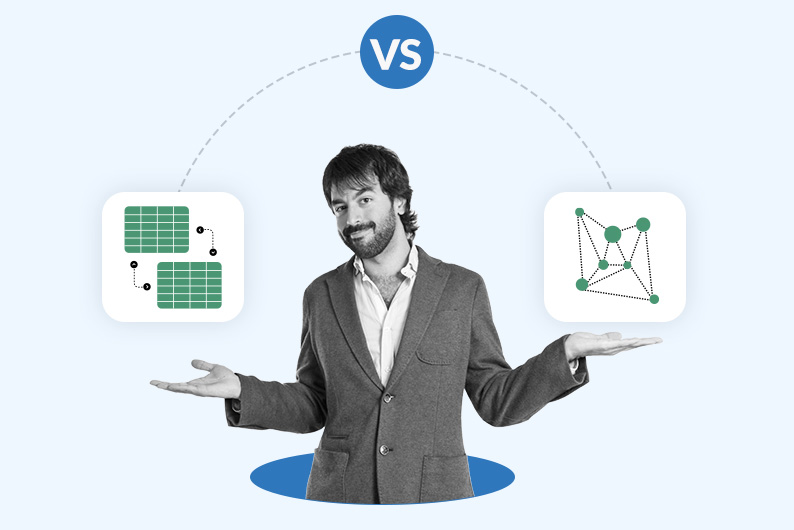The debate between the application of NoSQL and SQL is one of the most difficult choices for companies and app developers. Each type of database has its strengths, and choosing one depends on your app development needs. In this article, you will learn everything you need to know about NoSQL vs SQL databases and when to use each for your application.
SQL Databases: Overview
SQL – Structured Query Language is a conventional, relational database that has been taken into use for a long time. They structure data in a table form which consists of rows and columns to store it. These databases have a pre-design format that is used so that data is systematically organized in a given format.
SQL databases are commonly used in applications that need relational data and contain elements such as finance and enterprise products. They are best suited for use in situations where the relationships between the data are essential and data integrities are paramount.
Popular SQL Databases
- MySQL: A free and popular database characterized by high speed and stability of operation.
- PostgreSQL: An inflexible but high-performance RDBMS that comes with additional features and capacity for enhancement.
- Microsoft SQL Server: A commercial database with strong connectivity features for Microsoft products.
- Oracle Database: High-performance database software that has many uses and can be utilized for large-scale enterprise applications.
- SQLite: Oracle Lite is a lightweight and self-sufficient system for creating and using a database on the move.
Advantages of SQL Databases
The following are the benefits of SQL Database-
- Structured Data Storage: SQL databases are set for the management of the structured data thus making the applications which are structured and consistent to fit the SQL database management systems.
- ACID Compliance: They make applications reliable for transaction execution through Atomicity, Consistency, Isolation, and Durability protocols.
- Robust Querying: SQL gives a sophisticated querying mechanism for manipulating complex data, and this helps the developers to fetch the data analyzing easily.
- Widely Adopted: As compared to many other databases, SQL databases have rich community support and documentation that makes learning and using them more effortless.
- Integration with Legacy Systems: As with many older systems, lots of systems are based on SQL databases which is why integration is not a problem for businesses when they decide to upgrade systems.
Use Cases for SQL Databases
- Financial and Banking Applications: SQL databases are well suited for processing and providing secure and accurate transactional data.
- Enterprise Resource Planning (ERP) Systems: It is the way to maintain order within big enterprises and have proper control over their data.
- Customer Relationship Management (CRM) Tools: Both organized and relationship Customers are well maintained in SQL databases.
- E-Commerce Platforms: The SQL database is applied in the structured product catalogs and inventory systems.
- Applications Requiring Complex Transactions: Another field where SQL databases are applied is healthcare/insurance – with many specific and interconnected records.
NoSQL Databases: Overview
NoSQL or "Not Only SQL" databases are non-SQL which means unstructured or semi-structured data ONLY. As for SQL, it is important to note that they are not based on a fixed schema and are highly scalable. NoSQL databases perfectly suit today's applications that need high speed, easy scale-ability, and elastic nature. For example, the documents can be stored, key-value pairs and graph data which makes them ideal for dynamic and real-time based systems.
Popular NoSQL Databases
- MongoDB: A document-based storage of data with free, JSON-like schema.
- Cassandra: High availability computer system database favorable for scale-out execution.
- Couchbase: A document-oriented NoSQL with some key-value functionality added to its feature set.
- DynamoDB: A completely managed NoSQL database offered by Amazon Web Services.
- Redis: A fast and caching in-memory key-value store.
Advantages of NoSQL Databases
- Scalability: NoSQL databases are meant to handle the scalability horizontally way, then it becomes possible to manage vast data sets by splitting the data amongst numerous servers.
- Flexibility: This they achieve by supporting several types of data models such as the key-value, document, column-family, and graph models.
- High Performance: Assuming high availability of read and write, NoSQL databases are suitable in situations, which call for the needs of real-time analytics.
- Dynamic Schemas: Due to the flexibility of schema, NoSQL databases are ideal for data solutions with evolving requirements as changes to schema do not affect the application.
- Distributed Architecture: Replication and fault tolerance are introduced right into the design, making for reliable high availability, even at scale.
Use Cases for NoSQL Databases
- Social Media Platforms: They work well with unsteady and free-form data types such as posts, comments, and likes.
- IoT (Internet of Things) Applications: NoSQL databases deal with high-traffic real-time data from next-generation IoT devices.
- Big Data Analytics: They can manage big amounts of data ranging from logs of website activity and sensor data.
- Content Management Systems: Storage of a wide range of content such as video lessons, articles images, and other forms of content.
- Real-Time Applications: Instant messaging applications, gaming interfaces, and online media streaming solutions reap from NoSQL’s faster throughput.
Key Differences Between SQL and NoSQL
| Feature | SQL Databases | NoSQL Databases |
| Data Structure | Structured (tables) | Unstructured or semi-structured |
| Schema | Fixed | Dynamic |
| Scalability | Vertical | Horizontal |
| Query Language | SQL | Varies by database |
| Performance | Optimized for complex queries | Optimized for high-speed operations |
| Use Cases | Structured, transactional data | Real-time, large-scale data |
When to Choose SQL
- These are some of the primary arguments made in warding off NoSQL in preference to SQL.
- Structured Data Requirements: Your application works on structured data and schemas are pre-defined.
- Transactional Integrity: In applications such as banking and finance, you are going to need solid transactional integrity for example ACID compliance.
- Complex Querying Needs: Querying and reporting with your application’s data should be as complicated as the demands of your business.
- Legacy Integration: SQL-based legacy systems have to be supported by your application.
- Examples: Enterprise Resource Planning systems, conventional financial systems, and electronic commerce formats with pre-determined product listings and transactions.
When to Choose NoSQL
- Unstructured or Evolving Data: Large-scale unstructured or semi-structured data such as JSON documents or graphs, are managed by your application.
- High-Speed Operations: For real-time applications, you require high-speed read and write operations for systems requirements.
- Scalability and Flexibility: Scalability and flexibility are considered paramount for your project in particular for the applications that are posed to grow at a fast pace.
- Frequent Schema Changes: Your application inherently makes frequent changes to the schema due to numerous changes in data requirements.
- Examples: Businesses and applications operating in social media, IoT networks, and large data analysis.
To choose the best data management solution for the application, differing between NoSQL vs SQL should be in mind. Whereas SQL databases are specially designed for well-structured and high transactional applications, NoSQL databases are good for unstructured data, big data, and real-time applications.
If you are looking to implement RFID technology then consulting with a reliable software development company in Florida will ensure that you are making the right decision when it comes to choosing the software to support your requirements. If you require more of the conventional SQL database or want NoSQL solutions, the utilization of professional software development services guarantees your database initiative just complies with the objectives of the business.


 Previous blog
Previous blog



